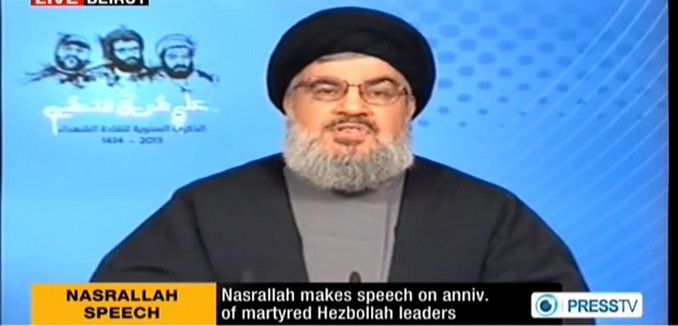Indications are growing that Hezbollah has made a series of tactical blunders, in Lebanon and beyond in Syria, which have the group scrambling to recover.
In Syria the Iran-backed group finds itself engaged in a deepening sectarian war with Al Qaeda-linked Sunni rebels who see Hezbollah as complete infidels, full stop. Just this week the London-based newspaper Asharq Alawsat reported that 12 Hezbollah men had been killed in fighting with the Free Syrian Army (FSA) west of Homs inside Syria. Tough battles have also reportedly been waged in recent days between Hezbollah and either the FSA or the jihadi group Jabhat al-Nusra in the Syria-Lebanon border area.
Inside Lebanon, the most recent speech by Hezbollah chief Hassan Nasrallah – marking “Martyrs’ Day” this week in Beirut – underscores the group’s growing political predicament in the country as the slow dissolution of the Syrian regime and state looms in the background.
Nasrallah dedicated a substantial proportion of his speech to threats directed against Israel and Jews. Mindful of closing supply lines running through Syria, he assured his audience that the “resistance” already has all the weapons of war it needs to bombard Israel’s civilian infrastructure
“Just a small number of rockets are needed to hit the airports, seaports and power stations of Israel… There are power stations that if struck, will cover Israel in darkness. Can it survive six months of darkness?”
Potentially more revalatory than Nasrallah’s now-routine bluster, however, was a reference to renewed demands inside Lebanon that Hezbollah disarm and allow the Lebanese government to take control of the country’s south. In an unprecedented personal attack, Nasrallah accused Saad al-Hariri, the leader of the March 14 Alliance, of trying to blackmail the organization for political gain.
Nasrallah said that during mediation efforts led by Turkey and Qatar, Hariri offered to annul the international tribunal into his father Rafik Hariri’s murder – to which Hezbollah is widely suspected to have been linked – and to allow Hezbollah to keep its weapons, in exchange for supporting Hariri as premier.
“Is this not blackmail?” Nasrallah fumed. “When the ‘resistance’ makes diplomatic concessions – relinquishing political control [in Lebanon] in exchange for protecting the homeland, is that a problem? We won’t accept that in exchange for the resistance disarming, the tribunal will be annulled and the entire country will pass into the hands of one man – that’s blackmail. We aren’t asking to just maintain our weapons, but the resistance itself. Weapons have no reason to exist other than protecting Lebanon and resisting Israel.”
Hezbollah is operating in the aftermath of what increasingly seems like a strategic decision to stake the reputation of the organization on rescuing the Assad regime, a gamble that increasingly seems to have been precarious. Al Jazeera has just reported that 600 troops – including 50 officers – defected from Assad’s ranks in the Damascus area. The firing of a Scud missile on a residential area of Aleppo, killing 20, can be viewed as underscoring Assad’s plight, and not his resources and power.
Nasrallah may sooner rather than later find himself and Hezbollah fighting without an ally in Damascus, with its weapons supply lines cut off, and surrounded by Sunnis, Druze, and Christians with decades of reasons to oppose Hezbollah – both in Syria and in Lebanon.
[Photo: LitleButerfli / YouTube]




